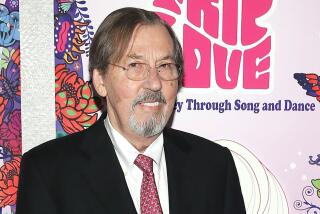Friedelind Wagner; Composer’s Granddaughter
- Share via
Friedelind Wagner, maverick granddaughter of Richard Wagner and a devotee of musical theater whose denouncement of the pro-Nazi Wagner festival launched by her family brought her scorn and ostracism, is dead.
Known internationally for both the lifelong battle she waged against Hitler’s influence and her encouragement of young artists, Miss Wagner was 73.
Judith Sullivan, a longtime friend, said from New York that Miss Wagner had been battling a liver ailment and may have had cancer when she died Wednesday in a hospital in Herdecke in the Ruhr area of Germany.
For years, after the 1930 death of her beloved father, Siegfried, and her grandmother Cosima (Franz Liszt’s daughter and Richard Wagner’s wife), she fought alone against the Nazi influence that permeated the famed Bayreuth Festival.
Friedelind’s British-born mother, Winifred, was a devotee of Adolf Hitler and her daughter found that she had to leave Germany at the outbreak of World War II, disgusted with both her family and the Nazis. Her departure was well publicized because of Hitler’s devotion to things Wagnerian.
She was in Switzerland when the war started and was briefly interned before Arturo Toscanini secured her release.
It was not until 1953 that she returned to Germany and Bayreuth where her brother, Wieland, had liberated the festival from politics and made of it a mecca for modern musical theater production.
In the interim she wrote a scathing autobiography (“Heritage of Fire”), further alienating her family and many fellow Germans while having to support herself by tasks ranging from waitressing to lecturing.
But thanks to Wieland Wagner, she was able to return to Bayreuth where she founded Festival Master Classes in 1959. She also became mentor and friend to dozens of aspiring artists and musicologists, among them the operatic director Walter Felsenstein; Edward Downs, the amiable music professor known as the host of the “Metropolitan Opera on the Air Quiz”; conductors Lawrence Foster and Peter Eros, and Bruce Hungerford, the late Australian concert pianist.
After Wieland’s death in 1966, her mother and other brother, Wolfgang, again assumed control of Bayreuth and Friedelind Wagner resumed her travels.
She lectured throughout Europe and America, broadcast in French on Swiss radio and tried unsuccessfully to find financial support for a musical theater academy.
In 1983 she was the featured guest on a PBS documentary devoted to her grandfather’s epochal operas “The Ring of the Nibelung.”
Martin Bernheimer, The Times’ music and dance critic, had known her for more than 30 years and remembered her Thursday as spending “most of her life swimming bravely against social, political and artistic currents that, under other conditions, would have supported her. . . .
“She had a knack for finding and nurturing fresh talent in unexpected locales. Ultimately, she accepted rejection from the Bayreuth Establishment with characteristic stoicism, with mildly bitter resignation and good humor. She also had a refreshing sense of self-mockery (and loved it when a friend insisted on calling her ‘Miss Rheingold’).”
More to Read
The biggest entertainment stories
Get our big stories about Hollywood, film, television, music, arts, culture and more right in your inbox as soon as they publish.
You may occasionally receive promotional content from the Los Angeles Times.










